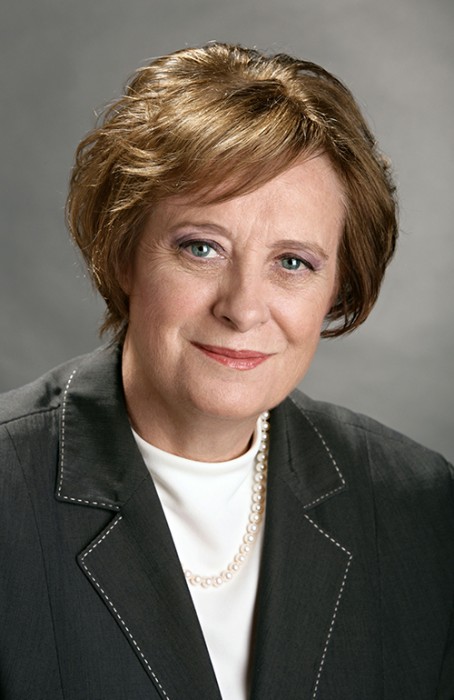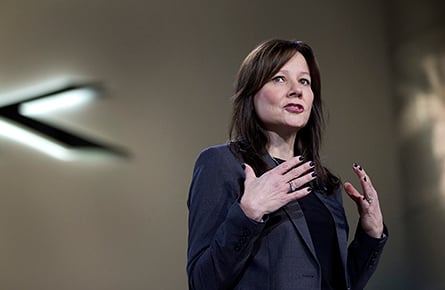First woman to head GM Canada weighs in on automaker’s first female CEO
In conversation with Maureen Kempston Darkes
Andrew Harrer/Bloomberg via Getty Images
Share

General Motors today announced it was appointing its first female CEO, Mary Barra, former senior vice-president of global product development. Before Barra there was Maureen Kempston Darkes, who became the first woman to reach the upper echelons of a North American auto company when she was appointed president of GM Canada in 1994. She was later tapped to head the automaker’s operations in Latin America, Africa and the Middle East. An Order of Canada Recipient, she retired from GM in 2009 and today sits on several corporate boards.
Q: What do you think of GM’s decision to appoint Mary Barra as its first female CEO?
A: I think Mary Barra will be an outstanding CEO. She is very well qualified. She knows the industry. She knows every aspect of the industry and in my view she is simply the best candidate to run General Motors.
Q: You were at GM for many years and so was she. Did your paths ever cross?
A: Many times. I have the highest regard for Mary. In later years she’s been hugely involved in engineering the product development programs and you can see with the recent products coming out just how successful she’s been.
Q: As you say, she’s most recently been in charge of product development. What does that say about GM’s priorities that she’s come from that side of the business?
A: Well I think CEOs can come from many distinct backgrounds, but clearly to me Mary bring a winning combination. Her engineering skills, her product development capabilities, her oversight of international product development operations, I think these are truly the right skill base for General Motors at this time.
Q: This is obviously a difficult time for the company coming out of government ownership. What do you see as the biggest challenges she’s going to face in assuming this role?
A: It’s such a very competitive industry and I think what we have to do is stay on top of our product development programs, make sure we continue to deliver value to the marketplace and a constant focus on the customer.
Q: You joined GM as a lawyer in the 1970s. What was it like at that time to break into the industry as a woman?
A: It certainly had its challenges. I can remember in 1975 when I joined General Motors those were the days when we had executive dining rooms and I would be the only woman in the executive dining room. It could be a very lonely place. Through the years of course more women came into the industry. But it was always a situation in those days, because there were so few women in the industry, that it was a challenge to prove your capabilities and really to have staying power in the industry.
Q: Was there overt sexism in the industry back then?
A: I don’t know that I’d say it was obvious. But certainly it wasn’t a perfect day every day for women in business. I think because there were so few of us it was difficult to establish our credentials in the business. So yes, on occasion some comments were made that today wouldn’t be made. But as women in the business we learned to deal with it, we learned to overcome them and we continue to grow in the business. But every day was not a perfect day.
Q: Can you elaborate on any of the experiences that you had?
A: Well, when you’d come into a room some people would say: ‘Well, gee, what does she know about the automotive industry?’ So you always felt challenged to put your ideas on the table, sustain your ideas and move the company forward. But I never looked for the downside. I was always looking for the upside and how I could make a difference. I believe that the women who have succeeded in the business always look on the positive side. The industry has changed dramatically over the years. You look at the number of women today in executive positions and you can see that it has grown tremendously and it really does value diversity. And you know, ask yourself: Why shouldn’t a woman be CEO of a car company? When you consider we probably buy 50 per cent of the cars and trucks and we influence more than 80 per cent of the purchase decisions. So there’s absolutely no reason why a woman shouldn’t be running an automotive company today.
Q: There’s still a huge discussion about why we haven’t reached gender parity when it comes to corporate boards and executive positions. What do you see as the challenges that are still holding back women in business?

A: I think there are some practical issues that we still need to deal with. First of all, to reach the CEO position in companies today, it’s not a question of just breaking through the glass celling, you’ve go to break through glass walls. Therefore, you have to be intent on getting out of your comfort zone and taking on a variety of potions that get you into key operating roles so that you learn the business. That’s very time-consuming. It’s very demanding. But I think in order to succeed in the C-Suite you have to undertake those challenges. And I think more and more women are beginning to do that. I also think we will see more women come onto boards because we’re seeing them going into more senior positions so their expertise will be sought by boards. Boards are ageing and so there will be more opportunity to bring women and broader diversity into the boardroom.
Q: A number of female CEOs speak about how women need to get outside of their comfort zone in business to succeed. Was there a specific point in your career where you said, I’m going to take that on even though I’m not sure this is something I’m ready for?
A: Well you have to remember my history with General Motors, I had only planned to work for General Motors of Canada for two years and then I was going to go back to practice law. But I got to the company and I enjoyed the business so much that I ended up staying for close to 35 years. I’ve just got gasoline in my blood. For me the opportunities were there to grow and develop and yes, I took them. Some of them were huge jumps outside of my comfort zone. Leaving General Motors of Canada and going to work in the global treasury centre of General Motors operations out of New York was a big jump outside of my comfort zone. Running General Motors of Canada was a big jump and then going from General Motors of Canada to one of the most diversified markets in the world, Latin America, Africa and the Middle East, also was a huge step outside of my comfort zone. But I don’t believe you can progress in business unless you are prepared to take some jumps out of your comfort zone. The important thing is to make sure women get the opportunity to do that.
Q: There’s this ongoing debate over whether women are the ones holding themselves back or whether there are institutional barriers to women advancing in business. How do you see it?
A: I think you have to look at it company by company. I do think today there is more opportunity for women to take on larger roles in business if they want to do it. But it does come at a cost. If you’re taking on larger roles, it probably means you’re investing more and more time in the business and if you have a family then you need support systems at home. So I think there’s more opportunity but it becomes in many ways an individual decision as to whether you want to take on that opportunity or whether this is the time in your life when you can take on that opportunity. I think those are very real issues for women.
Q: You sit on a number of boards. Does having more women on boards actually lead to better decision-making?
A: I think diversity in the boardroom is an important issue. It’s a very good business practice. What you’re trying to do is to get the broadest perspective on oversight, insight and foresight into the company and into its decisions. Broader diversity helps in that dialogue. I do notice when there are more women on boards that often the discussion can take on different elements and that’s a good thing.
Q: What do you mean by taking on different elements?
A: We might ask different kinds of questions. Things in our realm of experience might be different than what men have experienced. We might have different perspective on organizational leadership in the HR area; we might have some different experiences to share with the board and senior management on financial management. But bringing those kinds of questions to the foreground is a good thing. It’s constructive in the boardroom. Boardroom chemistry matters. I think when you have people that can sit around the boardroom table and talk directly at each other, being able to disagree without being disagreeable, you have strong board performance and therefore you have stronger company performance.
Q: Do you ever get tired of the fact that we’re still talking about these same issues: the glass ceiling, the work-life balance?
A: When I see Mary Barra’s elevation to the CEO of General Motors I’m glad we’ve had these discussions. Frankly, I’m just delighted. To me that is just such a huge step forward for all women to see what can be achieved and Mary Barra has truly set a new standard. That makes me very proud of what is occurring in business today for women. Do I still think we have a ways to go? Of course we do. But I do think when you have advances like we saw today with Mary that we are on the right road and we need to keep walking down that road. And individuals will continue to make personal choices as to what is right for them. But I do think that business is better served with having really talented individuals at the top of the companies and there’s absolutely no reason why women shouldn’t form the top position in the C-Suites. Mary’s advancement today just gives me new hope that more advances will be coming.